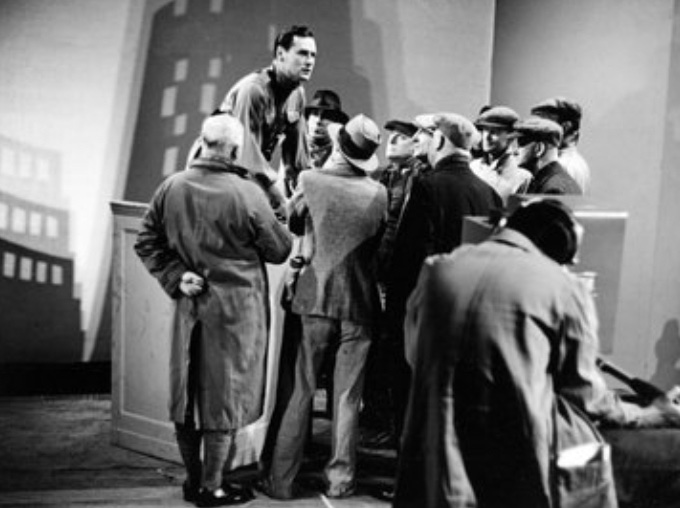OTD in early British television: 24 July 1938

John Wyver writes: The evening schedule of Sunday 24 July 1938 was occupied by Shakespeare’s The Tragedy of Julius Caesar (billed under its full name) given in modern dress by a strong company under the direction of the invariably innovative Dallas Bower. Ernest Milton was Caesar and D.A. Clarke-Smith Marcus Antonius, while Sebastian Shaw took the role of Brutus and Anthony Ireland, Cassius. Laura Cowie played Calpurnia, and Carol Goodner, Portia.
Bower set the political drama in an unidentified European state which observers were encouraged to see as a fascist regime. He also worked with designers Peter Bax and Malcolm Baker-Smith to use for the first time their ‘penumbrascope’, which threw abstracted patterns on a cyclorama to suggest a range of settings including cityscapes. In addition, he integrated a number of newsreel scenes, listed as ‘riots’, ‘gunfire’, explosions’ and ‘aeroplanes’.
The Manchester Guardian further described the production:
A modem dress version of Shakespeare’s Julius Caesar was televised last night. Lounge suits were worn by some of the men and uniforms with “Sam Brownes ” by others. One actor wore a blazer and white flannel trousers. There wore soft felt hats, revolvers, gas masks, and zip-fastening golf jackets, skyscrapers, and dugouts. The setting was in fact transferred from 44 BC to AD 1938, but there was no tampering with the text or alteration of the general construction of the play.
The Times offered a more detailed critique, and was generally sympathetic, including about the way in which Bower chose to present the soliloquies:
Mr. Dallas Bower is the most daring of the Alexandra Palace producers, and his empiric productions sometimes lead to strange results, but his version of Julius Caesar in modern dress last week was undoubtedly a success…
There is no doubt that Shakespeare is age-less in the sense that every age finds a new way of playing him, and since in a televised version we must lose the colour and the pageantry of a theatre perforrnance, the loss in putting the actors into tin helmets and military uniforms of the present day is practically nil.
The gain on the other hand is unexpectedly great, for the play, stripped of its classical trappings, becomes a present-day drama of power polities, and the atmosphere of intrigue and unrest is unfortunately but too real in certain countries to-day.
From the moment when Mr Sebastian Shaw and Mr. Anthony Ireland were discovered sitting at a cafe table, discussing the political situation over a glass of beer, looking like two Fascist officers, yet speaking the lines assigned to Brutus and Cassius, the attention of the audience was riveted. The modem surroundings gave a feeling of reality, and the music of the words was unimpaired.
Julius Caesar is rich in intimate scenes, which are the right vehicle for television drama, and the scenes with the women, whether at Caesar’s palace or at Brutus’ house, were as rational as a modem domestic drama. Even the boy Lucius, a little cherub in buttons, was successfully modernized.
The soliloquies were rather ingeniously achieved by allowing the actor to smoke his pipe silently, while a low voice whispered his thoughts.
So far so good, but Caesar’s murder provided the first serious difficulty, and it was only partially overcome. Mr. Ernest Milton’s Caesar was a crafty fellow, albeit with an element of greatness about him, who would almost certainly have had a bodyguard at hand.
The deaths of Cassius and Titinius at the end were even more difficult to handle, the lack of classical pageantry was felt and the substitution of revolvers for swords did not ease matters, nor was the sham rock on which Brutus was made to die a success. But the atmosphere of modem war was brilliantly achieved both in the tent scene and by the interpolation of graphic shots from a war film [G.W. Pabst’s 1930 drama West Front 1918].
The penumbrascope, a device for providing a background by means of shadows, which came into play for the first time in this production, was used so carelessly that its edges were often visible. The essence of stagecraft is illusion, which must not be shattered by such accidents.
Caesar’s ghost was also very unconvincing, nor did the handful of people listening to the funeral orations suggest an excited mob. The interpolation of film at this point, if it could have led up to the forum scene, would have been invaluable. But, in spite of these shortcomings, it was a most interesting production and well worth doing.
[OTD post no. 219; part of a long-running series leading up to the publication of my book Magic Rays of Light: The Early Years of Television in Britain in January 2026.]
Leave a Reply